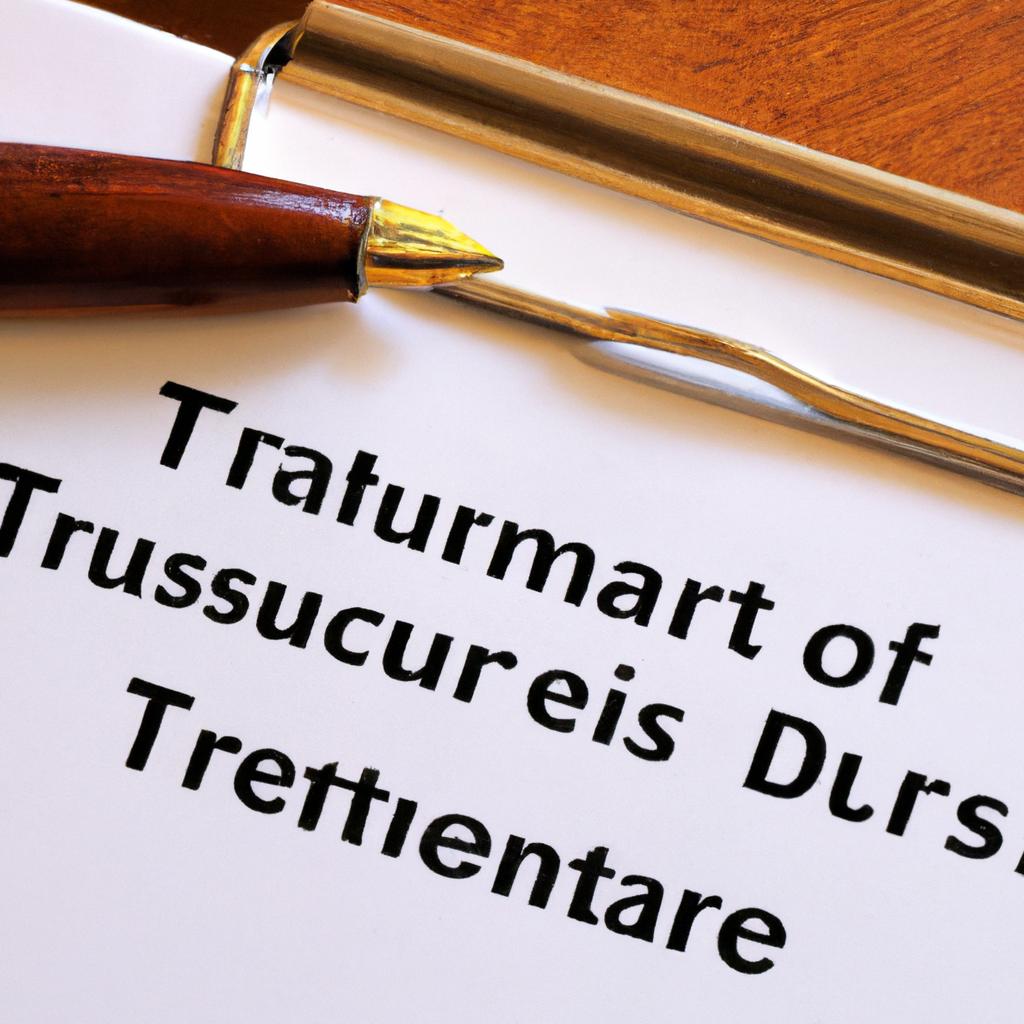In the intricate web of estate planning, the role of a trustee in a will stands as a linchpin of trust and responsibility. As legal custodians tasked with safeguarding and distributing assets according to the wishes of a decedent, trustees play a critical role in ensuring the seamless execution of a will. In this article, we delve into the intricate nuances of this pivotal position, exploring the duties, responsibilities, and considerations that trustees must navigate with meticulous care and diligence. Join us as we unravel the complexities of the trustee in a will, shedding light on the paramount importance of this role in the realm of estate planning.
Key Role of a Trustee in a Will
As a trustee in a will, you play a crucial role in ensuring that the wishes of the deceased are carried out effectively and responsibly. One of the key responsibilities of a trustee is to manage and distribute the assets of the estate according to the terms outlined in the will. This requires careful attention to detail and a thorough understanding of the legal and financial implications of each decision.
Another important role of a trustee is to act in the best interests of the beneficiaries. This involves making decisions that are fair and impartial, while also taking into consideration the long-term well-being of those who stand to inherit from the estate. Communication with beneficiaries is also essential to keep them informed about the status of the estate and to address any concerns they may have.

Duties and Responsibilities of a Trustee
As a trustee in a will, you hold a position of great responsibility and trust. Your duties include:
- Managing Trust Assets: It is essential to manage the assets in the trust prudently and in the best interests of the beneficiaries.
- Administering the Trust: This involves distributing assets as outlined in the will, paying any debts and taxes, and keeping accurate records of all transactions.
- Acting in Good Faith: Trustees must act honestly and in good faith, always putting the interests of the beneficiaries first.
Additionally, trustees have a fiduciary duty to:
- Avoid Conflicts of Interest: Trustees must avoid any conflicts of interest that could compromise their ability to act impartially.
- Communicate with Beneficiaries: Keeping beneficiaries informed about the trust and its administration is crucial to maintaining transparency and trust.

Choosing the Right Trustee for Your Will
When selecting a trustee for your will, it is crucial to choose someone who is trustworthy, reliable, and competent. The trustee will have the important responsibility of carrying out your wishes, managing your assets, and distributing them to your beneficiaries according to your instructions. Here are some factors to consider when selecting the right trustee:
- Trustworthiness: Ensure that the trustee is someone you can trust to act in the best interests of your estate and beneficiaries.
- Financial competence: The trustee should have a good understanding of financial matters and be able to manage your assets responsibly.
- Availability: Choose someone who is readily available and willing to take on the responsibilities of the trustee role.
| Factor | Consideration |
|---|---|
| Trustworthiness | Choose someone you trust. |
| Financial competence | Ensure they understand finances. |
| Availability | Select a person who is available. |

Important Considerations When Designating a Trustee
When designating a trustee in a will, there are several important considerations to keep in mind to ensure that your wishes are carried out effectively. The trustee plays a crucial role in managing and distributing the assets of the trust, so it is essential to choose someone who is trustworthy, reliable, and capable of handling financial matters responsibly.
<p>Some key factors to consider when selecting a trustee include:</p>
<ul>
<li><strong>Trustworthiness:</strong> The trustee should be someone you trust implicitly to act in the best interests of the beneficiaries and follow your wishes as outlined in the trust document.</li>
<li><strong>Financial responsibility:</strong> The trustee should have a good understanding of financial matters and be able to make wise investment decisions to grow and protect the trust assets.</li>
<li><strong>Availability:</strong> The trustee should be someone who is willing and able to dedicate the time and effort required to fulfill their duties effectively.</li>
<li><strong>Communication skills:</strong> The trustee should be able to communicate effectively with beneficiaries and other stakeholders to keep them informed about the trust's activities and decisions.</li>
</ul>
Q&A
Q: What is a trustee in a will?
A: A trustee in a will is a person or entity appointed to manage the assets and property of the deceased individual, also known as the grantor or testator, for the benefit of the beneficiaries named in the will.
Q: What are the responsibilities of a trustee in a will?
A: The trustee is responsible for carrying out the instructions outlined in the will, including distributing assets to the beneficiaries, paying off debts and taxes, and managing any ongoing trusts established by the grantor.
Q: How is a trustee chosen in a will?
A: The grantor typically designates a trustee in their will, often selecting a family member, friend, attorney, or financial institution to serve in this role. It is important to choose someone who is trustworthy, organized, and capable of handling financial matters.
Q: Can a trustee be removed from a will?
A: Yes, in some cases a trustee may be removed from a will if they are found to be unfit or unable to fulfill their duties. This can be done through a legal process that usually involves petitioning the court for their removal.
Q: What happens if a trustee cannot fulfill their responsibilities?
A: In the event that a trustee is unable to carry out their duties due to illness, death, or other circumstances, a successor trustee may be named in the will to step in and take over the role. If no successor trustee is designated, the court may appoint a new trustee.
Final Thoughts
In conclusion, being named as a trustee in a will is a significant responsibility that carries with it the duty to administer the deceased’s estate diligently and impartially. It is a role that requires trust, integrity, and a commitment to carrying out the wishes of the deceased. As a trustee, you have the power to ensure that the wishes of your loved one are fulfilled and their legacy is preserved. Embrace this role with honor and integrity, and remember that you have been entrusted with a great privilege. Thank you for reading, and may you carry out your duties as trustee with grace and wisdom.
 What is a Trustee in a Will and Why is it Important?
What is a Trustee in a Will and Why is it Important?
When creating a will, you may have come across the term “trustee.” But what exactly is a trustee in a will? A trustee is a person or entity who is responsible for managing the assets and finances specified in a trust as outlined in a will. This role is crucial in ensuring that the deceased’s final wishes and instructions are carried out smoothly and effectively. In this article, we will dive deeper into what a trustee is, their responsibilities, and the importance of having a trustee in a will.
Roles and Responsibilities of a Trustee
A trustee is responsible for managing and distributing the assets in a trust according to the instructions outlined in a will. They must act in the best interest of the beneficiaries and follow the trust’s terms and conditions. Below are some of the key roles and responsibilities of a trustee in a will.
1. Asset Management
One of the main responsibilities of a trustee is managing the assets listed in the will’s trust. This includes collecting and safeguarding all assets, such as property, investments, and cash, until they are ready to be distributed to the beneficiaries. The trustee must also maintain proper records and keep track of all financial transactions related to the trust.
2. Investment Management
In some cases, the trustee may be authorized to make investment decisions on behalf of the trust. This may include buying and selling stocks, bonds, and other assets to maximize the trust’s value and ensure long-term sustainability.
3. Distribution of Assets
The trustee is responsible for distributing the assets of the trust to the designated beneficiaries as outlined in the will. This may involve selling assets, dividing them among multiple beneficiaries, or managing them until the beneficiaries reach a certain age or meet specific requirements.
4. Tax Filing
The trustee is also responsible for filing tax returns on behalf of the trust. This includes paying any applicable taxes and ensuring that the trust remains in compliance with tax laws.
5. Keeping Beneficiaries Informed
The trustee must also keep the beneficiaries informed about the status of the trust and provide them with regular updates. This includes notifying them about any changes to the trust, the trust’s performance, and any difficulties or delays that may arise.
Why is a Trustee in a Will Important?
Having a trustee in a will is crucial for several reasons, including:
1. Ensuring Final Wishes are Followed
A trustee’s primary role is to ensure that the instructions outlined in a will are carried out as intended. By appointing a trustee, you can have peace of mind knowing that your final wishes will be carried out as you intended.
2. Protecting Assets
By appointing a trustee, you are entrusting someone with the responsibility of managing and protecting your assets until they can be distributed to the beneficiaries. This ensures that your assets remain safe and secure until they reach the intended recipients.
3. Handling Complex Financial Matters
Trustees are typically professionals with expertise in financial management. This makes them better equipped to handle complex financial matters relating to the trust, such as tax filing, investment management, and asset distribution.
4. Avoiding Family Conflicts
Appointing a trustee can help prevent family conflicts and disputes that may arise during the distribution of assets. This is because the trustee is an impartial party and makes decisions based on the instructions in the will, rather than personal interests.
Practical Tips for Choosing a Trustee
Choosing a trustee is a crucial decision that shouldn’t be taken lightly. Here are some practical tips to help you select the right trustee for your will.
1. Consider Professional Experience and Expertise
It is essential to choose a trustee who has experience and expertise in financial management. This can be a financial advisor, lawyer, or accountant who has a good track record and is familiar with trust laws.
2. Establish a Relationship of Trust
A trustee must act in the best interest of the beneficiaries, and this requires a high level of trust between all parties. Consider choosing someone who you are confident will fulfill this role with integrity and honesty.
3. Choose Someone Familiar with Your Finances
It is advisable to choose a trustee who is familiar with your financial situation and understands your priorities and values. This will make it easier for them to make decisions in line with your wishes.
Real-life Case Study: The Importance of a Trustee in a Will
In 2018, the death of the legendary singer Aretha Franklin brought to light the complications that can arise when a will does not have a designated trustee. Her estate is still tied up in court, as her four sons argue over the division of her assets. This situation highlights the importance of appointing a trustee to avoid family disputes and ensure a smooth distribution of assets.
In Conclusion
Having a trustee in a will is an essential aspect of estate planning. Their roles and responsibilities are crucial in ensuring that your final wishes are carried out as intended. By carefully choosing a trustee and providing them with clear instructions, you can have peace of mind knowing that your assets will be managed and distributed according to your wishes even after you’re gone. As always, it is advisable to consult a legal professional to ensure that your trustee selection and will are in accordance with local laws and regulations.
Meta Title: The Role and Importance of a Trustee in a Will: A Comprehensive Guide
Meta Description: What is a trustee in a will, and why is it important? This article provides valuable insight into a trustee’s roles and responsibilities, tips for selecting the right trustee, and a real-life case study. Read on to learn more about the importance of having a trustee in a will.

